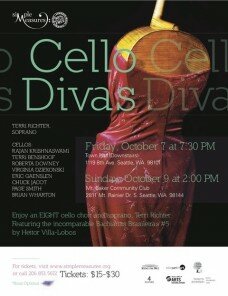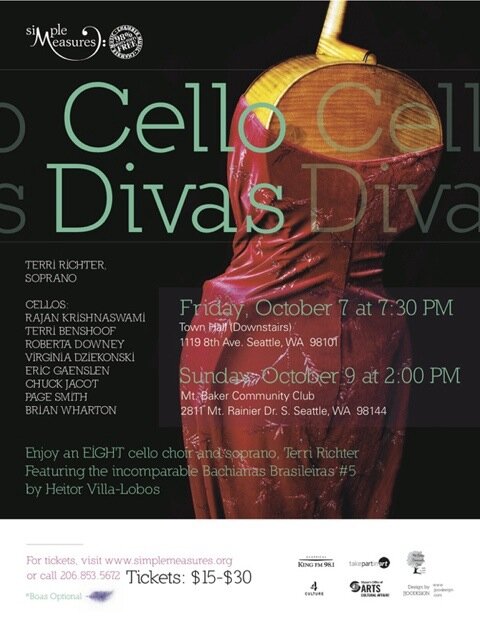 If you’ve never before heard a host of cellos playing together, you’d be astonished at the thrill of the sound, so rich and reverberant, so exciting. Such was my first reaction to the sound of six cellos playing a movement from a Vivaldi concerto for two cellos with four others taking the roles of violins, viola, and accompanying cello. Downstairs at Town Hall on Friday night, it was the opening work on a program for eight cellos and one soprano presented by Simple Measures.
If you’ve never before heard a host of cellos playing together, you’d be astonished at the thrill of the sound, so rich and reverberant, so exciting. Such was my first reaction to the sound of six cellos playing a movement from a Vivaldi concerto for two cellos with four others taking the roles of violins, viola, and accompanying cello. Downstairs at Town Hall on Friday night, it was the opening work on a program for eight cellos and one soprano presented by Simple Measures.
This lively organization, the brainchild of cellist Rajan Krishnaswami and now in its seventh year, aims to make classical music accessible, unalarming, and fun for all sorts of people including children, whether they know much about the genre or not. He gathers small groups of excellent musicians, performs with them wearing casual dress in unusual music venues like Mt. Baker Community Club or Q Café, and talks with the audience, not lecturing but having a discussion about the music. Usually the first half is short pieces or single movements which may relate to each other, and the second half is a full-length work.
Friday’s cello grouping is uncommon. It may have been that which drew the biggest audience Simple Measures has ever had, judging by the show of hands of cello-lovers in the hall, or maybe the centrality and space of the venue and ease of parking, or maybe because of the program’s big draw, the Bachianas Brasileiras No. 5 of Brazilian composer Villa-Lobos. Composed for eight cellos and a soprano, we rarely get a chance to hear this extraordinary work live, particularly with, as here, accomplished professional musicians and an equally accomplished singer.
It was the culminating highlight of a fun concert. The programming had been put together with a deft hand, and the musical points were mentioned lightly in introductions as chairs were rearranged.
The first half included a Gigue from one of the Bach Cello Suites, paired with a Toccata from a George Crumb sonata for solo cello, showing the three-century differences but also Crumb’s debt to Bach, plus a lively movement from a sonata for two cellos by the 18th century-cello virtuoso Boccherini, a delightful Bacchanalia supposedly by Chopin and arranged for three cellos, and a mystery work which was instantly recognizable to the audience who loved it, Led Zeppelin’s “Stairway to Heaven,” despite an overlong and somewhat dull performance.
The most arresting works came as the concert continued, with Golijov’s Lua Descolorida for soprano and string quartet played as written by four cellos, a fine arrangement of Faure’s Pavane for four instruments by cellist Chuck Jacot, and Villa-Lobos’ Bachianas Brasileiras No. 1, composed for a cello orchestra and here played with eight, preceding the final tour de force.
The Pavane made an excellent choice for arrangement, with cello sonorities blooming in this stately work, and Villa-Lobos created in his first Bachianas Brasileiras a work poetical, declamatory and fast. Best of all were the two works with soprano Terri Richter, a past Seattle Opera Young Artist whose voice has developed to a warm purity perfect for this kind of music.
The Golijov, described enigmatically by the composer as “a slow motion ride on a cosmic horse” opens with long melismatic phrases in the voice, with the vocal line then remaining separate from a slow, gently moving, harmonic accompaniment. It’s one of those works where exact pitch sense is crucial, and Richter achieved it effortlessly, her whole range to the highest notes easy and clear and almost without vibrato as is needed here.
Bachianas Brasileiras No. 5 is deservedly famous for the beautiful antigenicantilena with which it starts over soft, plucked strings, and then for the fast rhythmic second half with its imitations of bird song, if you listen carefully.
It was a treat to hear this live in a well rehearsed, satisfying performance with the right type of voice. Kudos go not only to Richter, a perfect choice for this, but to the eight cellists: Krishnaswami himself, Theresa Benshoof, Roberta Hansen Downey, Virginia Dziekonski, Eric Gaenslen, Chuck Jacot, Page Smith, and Brian Wharton. By the looks of it, they were enjoying themselves as much as the audience.
